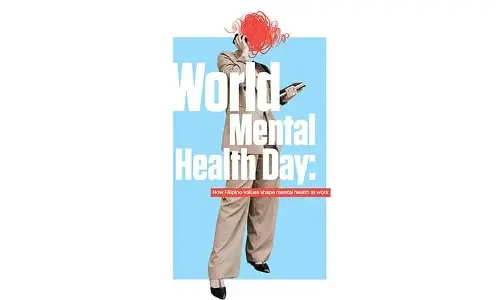
Filipinos are known for our resilience, but we must remember that true strength comes from acknowledging when we need support.
In celebration of National Mental Health Week, the Philippine Mental Health Association Inc. held an enriching family group session, featuring Dr. Shyne Calipara-Mangulabnan, PhD, RGC as one of the resource speakers.
With nearly two decades of experience specializing in family counseling and extensive expertise in workplace mental health across multinational companies in Southeast Asia and the Philippines, Dr. Mangulabnan shared valuable insights.Her talk, titled “Beyond Productivity: Harnessing Filipino Values to Enhance Mental Well-Being in the Workplace,” offered a culturally sensitive perspective on how deeply ingrained Filipino values can play a role in fostering mental well-being within professional environments.
New approach to workplace mental health
Dr. Mangulabnan began by pointing out how discussions around work often revolve around productivity, performance and output, leaving little room for the equally important topic of mental health. Unlike schools, where guidance counselors are readily available, most companies don’t have the same mental health support structures. This absence can make work environments more challenging, especially when balancing the pressures of job performance and mental well-being.
She emphasized that a culturally sensitive approach is crucial when addressing mental health in the Filipino workplace.
“In most of the companies we work at, we call our colleagues ‘Ate’ or ‘Kuya.’ In other countries, they go by first name basis already. These Filipino values remain intact even in a corporate setting,” she said. This dynamic illustrates how collectivism, respect and sensitivity shape Filipino interactions in the workplace, distinguishing them from more individualistic work cultures.
Filipino values in mental well-being
Dr. Mangulabnan explained that Filipino values such as bayanihan (community spirit), kapwa (shared identity), pakikiramay (sympathy) and pakikiramdam (sensitivity) play a vital role in promoting mental well-being at work.
“We, Filipinos, have a strong sense of community, known as bayanihan,” she said, citing how employees often rally together during times of hardship, like when a colleague loses a loved one. This collective spirit fosters empathy, care and support — key elements for creating a mentally healthy work environment.
Dr. Mangulabnan also explored the balance between collectivism and individualism. Filipino workers tend to prioritize harmonious relationships over individual competition.
“We’re always careful about what we say and how we say things,” she remarked. Filipinos’ deep respect for authority and hierarchy, alongside their adaptability and resilience, shape how they navigate work-related challenges. These values encourage teamwork and mutual support, further reducing stress and promoting well-being.
Addressing workplace challenges with Filipino values
Dr. Mangulabnan shared mental health statistics in the Philippines indicating that 63 percent of Filipinos recognize mental health as a critical issue, 78 percent said that the pandemic affected their mental health and 88 percent have experienced depression since 2022. However, common workplace stressors such as job insecurity, heavy workloads, family responsibilities and cultural stigma still prevail. She pointed out that in some companies, employees with mental health concerns are unfairly barred from working. “But that’s not allowed,” she emphasized, referring to the Department of Labor and Employment-mandated guidelines that every company must follow to ensure mental health support.
“We want to work in a place that understands our struggle. Our struggle as a first-time father; a mother who wants to attend their children’s ceremony,” she pointed out.
In overcoming these challenges, Dr. Mangulabnan highlighted the importance of shared identity (kapwa). “We Filipinos love being part of a community,” she said, adding that a sense of belonging promotes supportive relationships, collaboration and stress reduction. This collective mindset strengthens the workplace as it creates an environment where individuals feel empowered and valued.
She also discussed pakikiramay, or genuine concern during tough times. This value, she said, is essential in maintaining clarity and reducing workplace stress. “Leaders should ask if team members can handle deliverables, while employees must learn to ask about priorities,” she added. This open communication demonstrates a sense of belonging and alleviates feelings of isolation.
Sensitivity (pakikiramdam) was another key value Dr. Mangulaban emphasized. “It’s okay to not talk about your feelings right away,” she explained, “but we should be sensitive enough to ask at the right time and with genuine concern.” She reminded the audience that sometimes a simple question like, “Are you okay?” can make all the difference in someone’s mental state.
Building a mentally healthy workplace
In closing, Dr. Mangulabnan offered practical steps for fostering mental health in the workplace. Psychological safety, regular feedback, career development opportunities, and mental health resources were just some of the initiatives she encouraged companies to adopt. “A thank you can go a long way,” she said, stressing the importance of recognizing and rewarding employees’ contributions.
She urged leaders to move beyond compliance with DOLE guidelines and take intentional steps toward creating a supportive work environment. Whether through stress management workshops or offering classes, workplaces should make mental health a priority — not just a regulatory requirement.
Dr. Mangulabnan’s seminar reminded us that mental health is not only an emotional concern but also a psychological and social one. By integrating Filipino values into workplace culture, companies can create environments that are not only productive but also mentally healthy and supportive for their employees.
In the end, as Dr. Mangulabnan put it, “Being listened to, being talked to — that’s the oxygen of our mental health.”